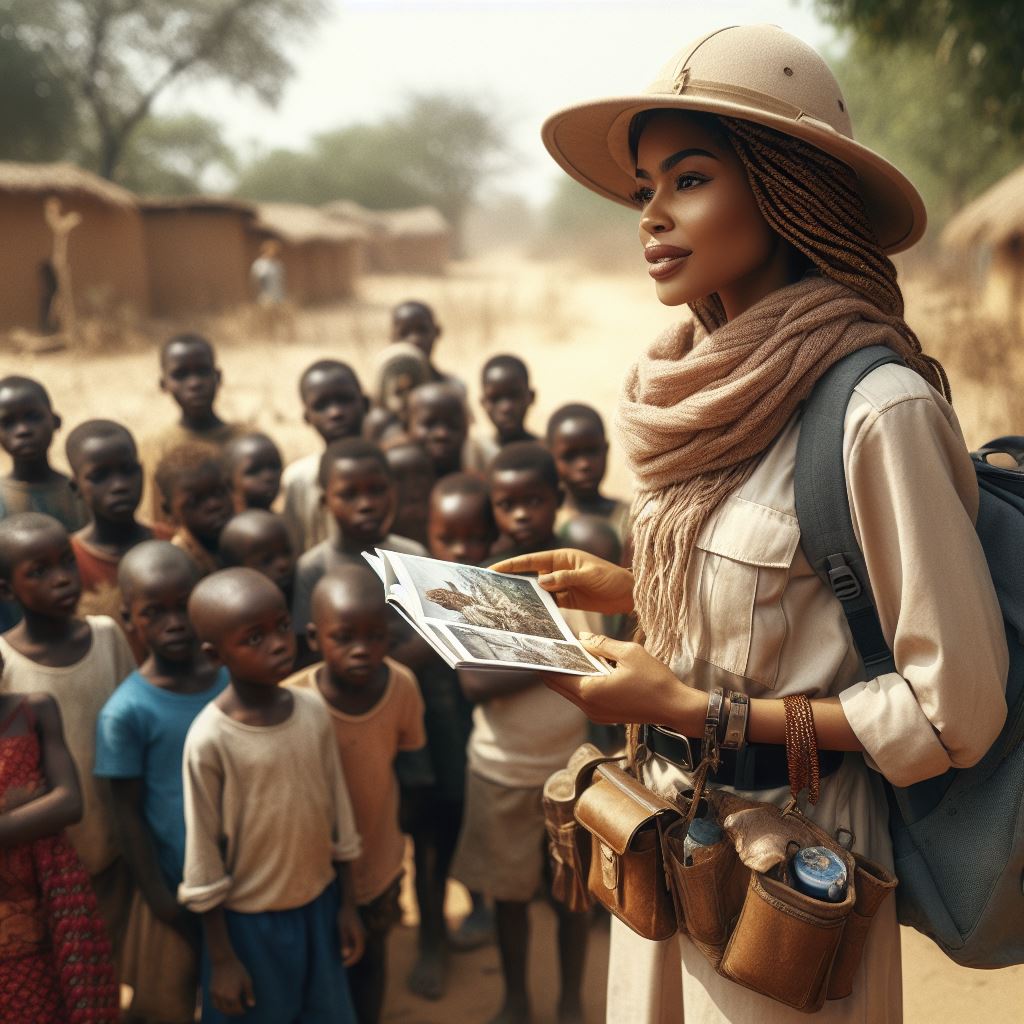Introduction
Anthropology delves into human societies, exploring their development, customs, and beliefs for Anthropology and Nigeria rich cultural heritage.
This discipline provides critical insights into how cultures evolve and interact over time.
By studying anthropology, we gain a deeper understanding of the intricate tapestry of human life, uncovering the rich diversity that defines our world.
Anthropology delves into human societies, exploring their development, customs, and beliefs. This discipline provides critical insights into how cultures evolve and interact over time.
By studying anthropology, we gain a deeper understanding of the intricate tapestry of human life, uncovering the rich diversity that defines our world.
The Relevance of Anthropology in Understanding Cultures
Anthropology is pivotal in understanding the essence of different cultures. It examines how societies function, their rituals, and their social norms.
Through anthropological studies, we can appreciate the complexity and uniqueness of various cultural practices. This understanding fosters respect and empathy among different communities, promoting global harmony.
Anthropologists employ various methods to study cultures, including participant observation, interviews, and archival research. These techniques allow them to gather comprehensive data about a society’s way of life.
By analyzing this data, anthropologists can reveal patterns and connections that may not be immediately obvious.
Nigeria’s Diverse Cultural Landscape
Nigeria stands as a beacon of cultural diversity in Africa. With over 250 ethnic groups, each possessing its distinct language, customs, and traditions, Nigeria’s cultural landscape is incredibly rich and varied.
This diversity is a testament to the country’s long and complex history.
The major ethnic groups in Nigeria include the Hausa, Yoruba, and Igbo, among others. Each of these groups has its unique cultural practices, from festivals to traditional attire and cuisine.
The Hausa people are known for their vibrant festivals and intricate crafts showing anthropology and Nigeria rich cultural heritage.
The Yoruba are celebrated for their rich mythology and elaborate ceremonies.
The Igbo are recognized for their entrepreneurial spirit and traditional masquerades.
The Need to Explore Nigeria’s Culture Through Anthropology
Exploring Nigeria’s cultural heritage through anthropology is essential for several reasons. First, it helps preserve these diverse traditions and customs for future generations.
As globalization progresses, there is a risk of losing unique cultural identities.
Anthropological studies ensure that these traditions are documented and appreciated.
Second, understanding Nigeria’s cultural diversity can enhance national unity. By appreciating the differences and similarities among Nigeria’s ethnic groups, citizens can foster a sense of national pride and cohesion.
This unity is crucial for the country’s social and political stability.
Third, anthropological research can contribute to Nigeria’s development. By understanding the cultural contexts of various communities, policymakers can design more effective and culturally sensitive development programs.
These programs are more likely to succeed because they align with the values and needs of the local populations.
Generally, anthropology plays a vital role in uncovering and preserving Nigeria’s rich cultural heritage. Through this discipline, we gain a deeper appreciation for the diverse customs and traditions that define Nigerian society.
By exploring Nigeria’s cultural landscape through anthropology,
we can ensure that these unique identities are celebrated and preserved for future generations.
This understanding not only enriches our knowledge but also promotes unity and development within the nation.
Historical Background of Nigeria’s Cultural Heritage
Overview of Nigeria’s History and Its Influence on Cultural Landscape
Nigeria’s history dates back thousands of years, characterized by diverse kingdoms and empires.
The Nok civilization, existing around 1000 BC, is one of the earliest known in Nigeria.
This ancient society is renowned for its terracotta sculptures, reflecting sophisticated artistry.
The Yoruba and Benin Kingdoms, flourishing from the 11th century, further enriched Nigeria’s cultural heritage.
These kingdoms produced intricate bronze and ivory art, symbolizing political power and spiritual beliefs.
During the 15th century, European explorers and traders arrived, initiating significant changes. The transatlantic slave trade disrupted many societies, leading to cultural displacement and transformations.
However, Nigerian communities adapted, preserving core traditions while integrating new influences.
Colonial rule in the late 19th and early 20th centuries introduced Western education, Christianity, and new administrative systems. These changes affected cultural practices, blending traditional and modern elements.
Post-independence Nigeria, since 1960, has witnessed a renaissance of cultural pride. Nigerians have embraced their heritage, celebrating it through festivals, arts, and academic research.
Ethnic Groups and Their Unique Traditions
Nigeria is home to over 250 ethnic groups, each contributing to the nation’s rich cultural tapestry. The Hausa-Fulani, Yoruba, and Igbo are the largest groups, each with distinct traditions.
Hausa-Fulani
The Hausa-Fulani, predominantly in northern Nigeria, are known for their hierarchical societies and Islamic culture. They celebrate the Durbar festival, showcasing horse riding, music, and elaborate costumes.
Traditional Hausa architecture, characterized by intricate designs and mud-brick structures, reflects their artistic heritage.
Yoruba
The Yoruba, located in southwestern Nigeria, have a rich pantheon of deities and vibrant festivals. The Eyo Festival in Lagos features costumed dancers honoring the spirits of the ancestors.
Yoruba art, especially the bronze heads from Ife, is renowned worldwide. Their oral literature, including proverbs and folktales, preserves historical knowledge and moral lessons.
Igbo
The Igbo, mainly in southeastern Nigeria, practice a decentralized system of governance with emphasis on community and kinship.
They celebrate the New Yam Festival, symbolizing gratitude for bountiful harvests. Igbo traditional attire, featuring bright colors and beads, highlights their love for aesthetics. Their intricate uli body and wall designs demonstrate their artistic expression.
Other Ethnic Groups
Other notable groups include the Tiv, Efik, and Kanuri. The Tiv, in central Nigeria, are famous for their dances and masquerades, especially during harvest festivals.
The Efik, in the Niger Delta, perform the Ekpe masquerade, representing spiritual beings. The Kanuri, in northeastern Nigeria, have a rich history of Islamic scholarship and horse-riding traditions.
Basically, Nigeria’s cultural heritage, shaped by its historical trajectory, is a testament to its resilience and diversity. From ancient civilizations to contemporary celebrations, each ethnic group contributes unique traditions.
Understanding Nigeria’s history and cultural practices offers a profound appreciation of its dynamic cultural landscape. By embracing and promoting these traditions, Nigerians continue to celebrate their rich heritage, ensuring its preservation for future generations.
Read: Communication Arts: Job Prospects and Salaries
Anthropological Studies in Nigeria
Anthropology plays a crucial role in understanding and preserving Nigeria’s rich cultural heritage. Through systematic research, anthropologists uncover, document, and interpret the diverse cultural practices that define Nigeria.
Their work ensures that traditional knowledge is not lost to modernization.
Importance of Anthropological Research in Preserving Cultural Heritage
Anthropological research is essential for preserving Nigeria’s cultural heritage. It records oral histories, traditional practices, and social customs.
By documenting these elements, anthropologists help prevent the erosion of cultural identity. Their work provides a historical record for future generations.
Moreover, anthropological studies foster cultural appreciation and understanding. They educate the public about the significance of various traditions and practices.
This awareness promotes respect for cultural diversity and encourages the preservation of unique cultural elements.
Anthropologists also contribute to policymaking. Their insights help governments and organizations create informed cultural preservation strategies.
By understanding cultural dynamics, policymakers can develop programs that support traditional practices and protect cultural sites.
Examples of Anthropological Studies Conducted in Nigeria
Numerous anthropological studies have been conducted in Nigeria, each contributing significantly to cultural understanding. One notable example is the research on the Nok culture.
This ancient civilization, known for its terracotta sculptures, provides insights into early Nigerian art and society. Anthropologists have uncovered artifacts that reveal complex societal structures and artistic achievements.
Another significant study focused on the Yoruba religion and its rituals. Anthropologists documented traditional beliefs, practices, and ceremonies.
This research highlighted the rich spiritual life of the Yoruba people and their influence on Afro-Caribbean religions. It also helped preserve sacred texts and practices that might otherwise have been forgotten.
The Igbo people’s cultural heritage has also been a subject of extensive research. Anthropologists have studied their traditional governance systems, kinship structures, and festivals.
These studies have illuminated the intricate social organization and cultural vibrancy of the Igbo. The documentation of their annual festivals, such as the New Yam Festival, showcases the importance of agriculture and community in Igbo culture.
In Northern Nigeria, research on the Hausa and Fulani has provided a deeper understanding of their nomadic lifestyles and social structures.
Anthropologists have explored the Fulani’s cattle-herding traditions and their impact on the region’s economy and culture. Studies on the Hausa have revealed their rich history in trade, education, and Islamic scholarship.
In general, anthropological research is vital for documenting and preserving Nigeria’s cultural heritage. Through detailed studies, anthropologists capture the essence of Nigeria’s diverse cultures.
Their work not only protects traditional knowledge but also promotes cultural understanding and appreciation. By highlighting the contributions of various ethnic groups, anthropological studies ensure that Nigeria’s rich cultural tapestry remains vibrant for future generations.
Read: Digital Media Trends in Communication Arts
Impact of Globalization on Nigeria’s Cultural Heritage
Globalization has sparked profound changes in Nigerian culture, both enriching and challenging its rich heritage.
Influence of Globalization on Nigerian Culture
Traditional Nigerian customs have been impacted by globalization, as Western ideas blend with indigenous practices.
Foreign media, particularly Hollywood movies and Western music, have permeated Nigerian society, altering cultural norms.
Western fashion trends have gained popularity among Nigerian youth, reshaping traditional clothing preferences.
The internet and social media platforms have facilitated the spread of global influences, shaping Nigerian lifestyle choices.
Challenges in Preserving Cultural Heritage
Globalization poses significant challenges to preserving Nigeria’s cultural heritage, threatening its uniqueness and authenticity.
Westernization often leads to the erosion of traditional values, languages, and customs within Nigerian communities.
Commercialization of cultural artifacts for tourist consumption can distort their original meaning and significance.
Urbanization and modernization contribute to the loss of traditional practices and architectural heritage in Nigerian cities.
Opportunities for Cultural Preservation
Despite challenges, globalization also presents opportunities for preserving Nigeria’s cultural heritage through innovative approaches.
Transform Your Career with Expert Guidance
Get personalized mentorship consulting that’s tailored to your unique path. Our expert advice is actionable and exclusive.
Get StartedIncreased global awareness and appreciation of Nigerian art, music, and cuisine can foster cultural pride and preservation efforts.
Technological advancements enable the digital documentation and dissemination of Nigeria’s cultural heritage to a global audience.
Cross-cultural collaborations and exchanges promote the sharing of knowledge and resources for preserving Nigerian traditions.
In essence, Globalization’s impact on Nigeria’s cultural heritage is complex, presenting both opportunities and challenges for its preservation.
While globalization introduces diverse influences, it also threatens the authenticity and integrity of Nigeria’s rich cultural legacy.
Efforts to safeguard Nigerian traditions amidst globalization must prioritize community engagement, education, and sustainable development.
Read: Famous Nigerian Alumni of Communication Arts Programs

Role of anthropology in cultural preservation
Understanding Cultural Preservation
Anthropology plays a pivotal role in safeguarding anthropology and Nigeria rich cultural heritage..
Through meticulous research and active engagement, anthropologists contribute significantly to preserving the diverse traditions, languages, and customs that define Nigeria’s identity.
Documentation of Traditional Practices
One of the fundamental tasks of anthropologists is to document traditional practices that are at risk of being lost or forgotten.
By immersing themselves in local communities, anthropologists gather invaluable insights into rituals,
ceremonies, and social norms that have been passed down through generations.
Preserving Endangered Languages
Anthropologists actively work to preserve endangered languages, recognizing them as repositories of unique cultural knowledge.
Through linguistic studies and community-based initiatives, efforts are made to revitalize indigenous languages and ensure their survival for future generations.
Reviving Traditional Crafts and Artistry
Anthropologists collaborate with artisans and craftsmen to revive traditional crafts and artistry.
By documenting techniques and materials used in ancient practices such as weaving, pottery, and metalwork, they help sustain these time-honored traditions amidst modernization.
Conservation of Sacred Sites
Anthropologists play a vital role in the conservation of sacred sites, recognizing their cultural and spiritual significance. Through ethnographic research and community partnerships, efforts are made to protect these sites from encroachment and degradation.
Promoting Cultural Exchange
Anthropologists facilitate cultural exchange programs that foster mutual understanding and appreciation among different ethnic groups in Nigeria.
By organizing festivals, workshops, and exhibitions, they create platforms for showcasing diverse cultural expressions and promoting dialogue.
Examples of Successful Preservation Efforts
In northern Nigeria, anthropologists collaborated with local communities to revive the ancient art of dyeing indigo textiles.
By documenting traditional dyeing techniques and training younger generations, this craft has experienced a resurgence, contributing to economic empowerment and cultural pride.
In the Niger Delta region, anthropologists worked with indigenous communities to preserve traditional ecological knowledge related to sustainable fishing practices.
Through participatory research and community-based management initiatives, efforts have been made to conserve aquatic resources while maintaining cultural integrity.
In southwestern Nigeria, anthropologists partnered with Yoruba traditional rulers to safeguard sacred groves threatened by urbanization.
Through advocacy and community mobilization, these efforts have led to the recognition of sacred groves as protected cultural landscapes, ensuring their preservation for future generations.
In review, anthropology serves as a cornerstone in the preservation of Nigeria’s cultural heritage.
By documenting traditional practices, preserving endangered languages, reviving traditional crafts, conserving sacred sites, and promoting cultural exchange, anthropologists contribute to the resilience and vitality of Nigeria’s diverse cultural tapestry.
Read: Exploring Semiotics in Communication Arts
Cultural Practices and Traditions in Nigeria
Nigeria is a country rich in cultural diversity, with over 250 ethnic groups each having its unique cultural practices and traditions. These practices play a crucial role in shaping the identity of the nation as a whole.
Overview of some of the key cultural practices and traditions in Nigeria
- Traditional Marriage Ceremonies
- Art and Craftsmanship
- Festivals and Celebrations
- Cuisine and Food Culture
- Music and Dance
Traditional marriage ceremonies in Nigeria are elaborate affairs that involve several stages, including the payment of bride price, traditional rites, and festivities that may last for days.
Art and craftsmanship are highly valued in Nigerian culture, with each ethnic group having its unique styles and techniques.
From intricate beadwork to colorful fabrics, Nigerian artisans showcase their skills in various forms of art.
Festivals and celebrations are an integral part of Nigerian culture, with each ethnic group having its unique festivals to celebrate harvest, historical events, or religious beliefs.
These festivals are marked by colorful costumes, music, dance, and traditional rituals.
Nigerian cuisine is diverse and flavorful, with each ethnic group having its traditional dishes and cooking methods. From spicy soups to pounded yam and jollof rice, Nigerian cuisine reflects the country’s rich culinary heritage.
Music and dance are an essential part of Nigerian culture, with each ethnic group having its unique musical instruments, dance styles, and rhythms. From the highlife music of the Igbo people to the afrobeat sound of Fela Kuti, Nigerian music is diverse and vibrant.
The significance of these practices in preserving the cultural identity of Nigeria
The cultural practices and traditions in Nigeria play a vital role in preserving the rich cultural heritage of the country considering anthropology and Nigeria rich cultural heritage.
These practices are passed down from generation to generation, serving as a link to the past and a source of cultural identity for Nigerians.
Traditional marriage ceremonies, art and craftsmanship, festivals, cuisine, music, and dance are all integral parts of what makes Nigeria unique. These practices help to define the cultural identity of each ethnic group and contribute to the overall diversity of the country.
By preserving these cultural practices, Nigerians are able to maintain a strong sense of identity and pride in their heritage.
These traditions also serve as a way for Nigerians to connect with their roots, celebrate their cultural diversity, and promote unity and understanding among different ethnic groups.
In fact, the cultural practices and traditions in Nigeria are essential in preserving the country’s rich cultural heritage and promoting unity among its diverse population.
These practices are a source of pride and identity for Nigerians, and they play a crucial role in shaping the nation’s cultural landscape for generations to come.
Conclusion
In closing, anthropology emerges as a crucial tool. It offers insights into Nigeria’s diverse cultural heritage. Through meticulous study, it unveils the intricate tapestry of traditions, beliefs, and practices that define Nigeria’s identity.
Recap of the Importance of Anthropology
Anthropology provides a lens through which we can comprehend the complexities of Nigeria’s rich cultural tapestry considering anthropology and Nigeria rich cultural heritage.
It delves deep into the customs, rituals, and social structures that have evolved over centuries.
Through ethnographic research, anthropologists unravel the unique dynamics of Nigeria’s various ethnic groups. They document languages on the brink of extinction and traditions threatened by modernization.
Their work sheds light on the resilience of indigenous knowledge systems and the adaptability of traditional practices in a rapidly changing world.
Moreover, anthropology fosters cross-cultural understanding and promotes dialogue among diverse communities showing anthropology and Nigeria rich cultural heritage.
It challenges stereotypes and fosters appreciation for the richness of Nigeria’s cultural mosaic.
By recognizing shared values and celebrating differences, anthropology lays the groundwork for a more inclusive society.
Call to Action for Continued Research and Preservation Efforts
Despite the invaluable contributions of anthropology, Nigeria’s cultural heritage faces numerous threats. Rapid urbanization, globalization, and environmental degradation endanger traditional ways of life.
In the face of these challenges, there is an urgent need for continued research and preservation efforts.
Anthropologists must collaborate with local communities to safeguard intangible cultural heritage.
By empowering community members to document their own traditions, anthropologists can ensure their preservation for future generations.
This participatory approach fosters a sense of ownership and promotes sustainable practices that respect cultural diversity for anthropology and Nigeria rich cultural heritage.
Furthermore, policymakers must recognize the importance of cultural preservation in national development agendas. Investing in cultural institutions, such as museums and archives, can help preserve artifacts and oral histories for posterity.
Educational initiatives aimed at promoting cultural awareness and pride are also essential in nurturing a sense of belonging among Nigeria’s diverse population.
In closing, anthropology serves as a beacon of hope in safeguarding Nigeria’s rich cultural heritage. By championing research, preservation, and education, we can ensure that future generations inherit a legacy of diversity and resilience.
Together, let us commit to preserving Nigeria’s cultural heritage for the benefit of all.




